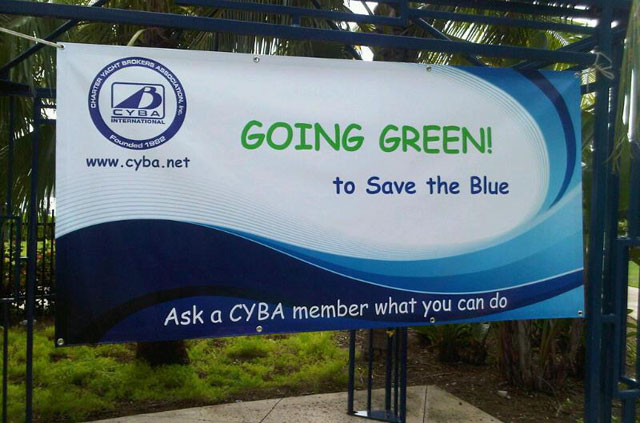If you could save $9,000 on your yacht’s annual expenses, you’d do it, right? Banning plastic bottles aboard and instead relying on your yacht’s watermakers can make it happen. It did for one megayacht owner, in fact, who participates in the Going Green to Save the Blue campaign. It’s an initiative targeting charter-yacht owners, crews, and guests.
Now in its fifth year, Going Green to Save the Blue is led by the Charter Yacht Brokers Association (CYBA). While the organization’s primary focus is professionalism in the industry, it realizes it can have a broader impact. Trish Cronan, CYBA’s president, came up with the campaign. “Trash is not a glamorous subject,” she says. “It is downright toxic when you think of millions of plastic water bottles that superyachts and charter yachts send to landfills each year.”
Going Green to Save the Blue involves educating owners and crews that yacht-made water dramatically reduces waste. In fact, CYBA says that just eliminating plastic bottles cuts plastic garbage in half aboard the participating yachts. The yachts often provide guests with refillable, reusable bottles. Equally important, the water tastes normal. CBYA says that one charter-yacht owner tells them he’s saving $9,000 annually simply having switched to made-onboard water.
To further promote Going Green to Save the Blue, CYBA holds what it calls a Designer Water contest. The annual competition invites a variety of crews to get creative with “yacht made” water. This year, more than 12 yachts ranging from a 60-foot catamaran to a 250-foot-plus motoryacht participated. Three selections stood above the rest:
- hibiscus martini water, from the 111-foot sailing superyacht Ree
- coriander and passion fruit water, from the 265-foot classic replica Nero
- moranga-infused detoxifying water, from the 183-foot sailing superyacht Rosehearty (moranga is sometimes called pink pumpkin, a type of squash).
On a side note, Going Green to Save the Blue involves encouraging other environmentally friendly practices, like selecting natural, biodegradable sunscreens. But, from local news broadcasts to documentaries, we’re all becoming painfully aware of the problem of plastics in our oceans. That’s why CYBA is continuing to make plastic elimination a priority.










Leave a Reply